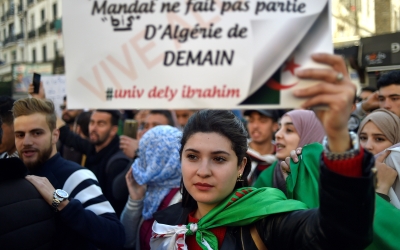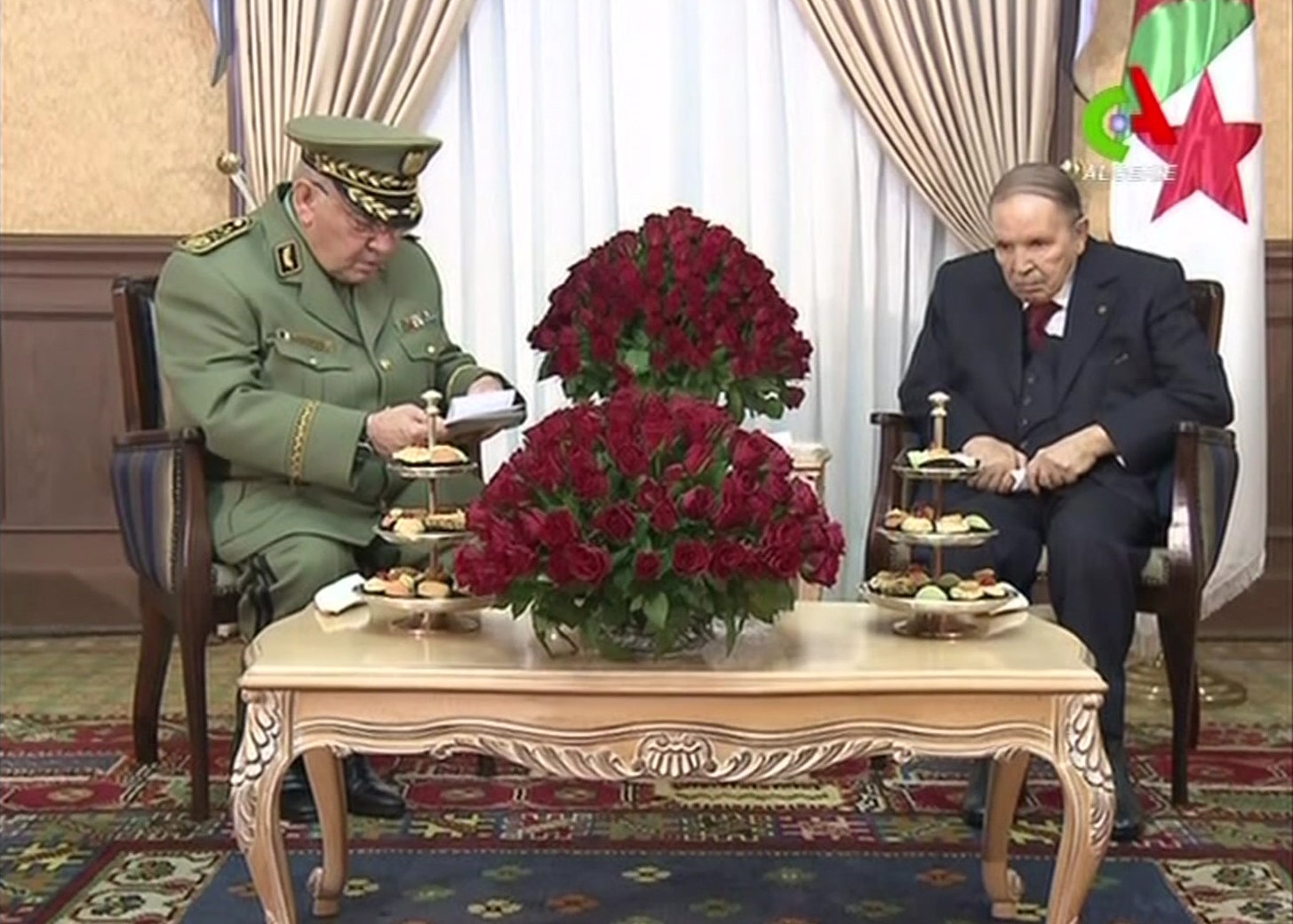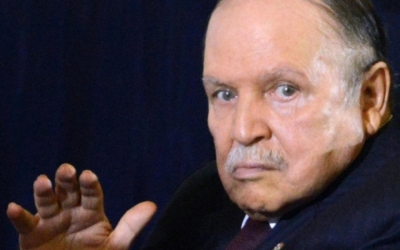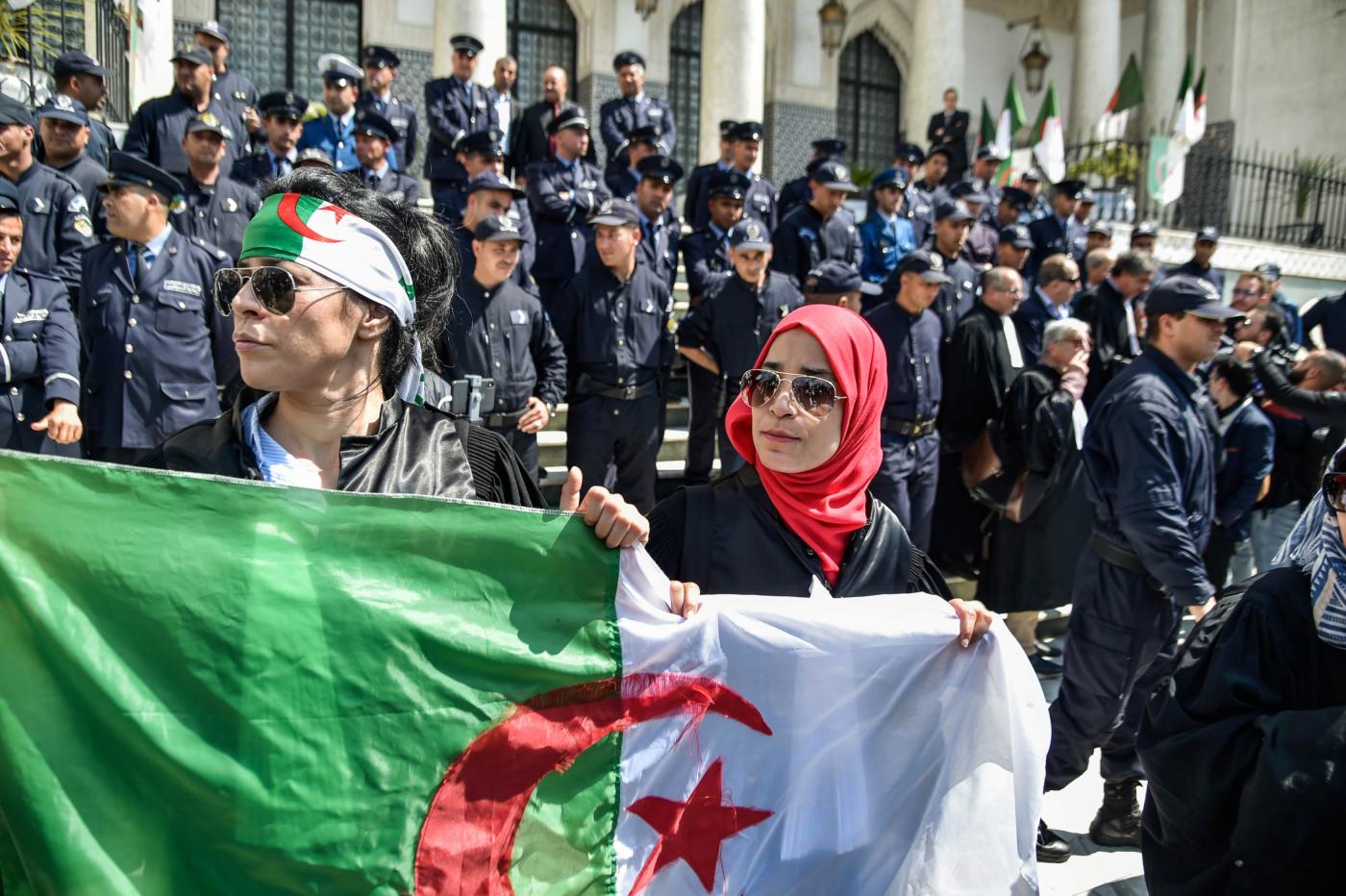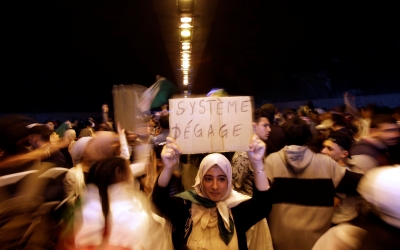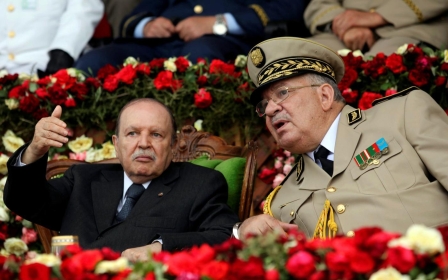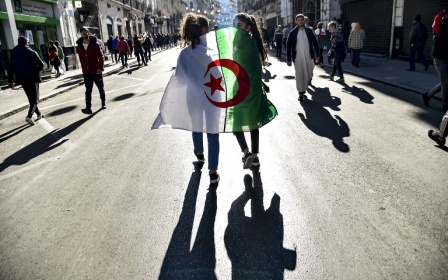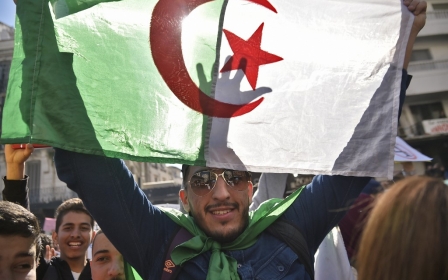Ahmed Gaid Salah: Algeria's political survivor

The veteran general Ahmed Gaid Salah has become the Algerian official with the heaviest weight on his shoulders as popular protests continue. As the Algerian army’s chief of staff, he is responsible for setting the course of his country’s future.
An officer in the National Liberation Army, and then in the Algerian People’s National Armed Forces, Gaid Salah spent his entire life in the military, working his way to the top.
There is, though, a problem. He was appointed to his current, most prestigious position by former president, Abdelaziz Bouteflika, in 2004 at the beginning of his second mandate, and remained a close ally even after Bouteflika suffered a stroke in April 2013 that left him physically diminished.
Right place at the right time
Why is Gaid Salah, Bouteflika’s right-hand man who backed his fourth and fifth mandates, the man who came to oust his former boss and is now tasked with doing the same to most of the political class of the past two decades?
New MEE newsletter: Jerusalem Dispatch
Sign up to get the latest insights and analysis on Israel-Palestine, alongside Turkey Unpacked and other MEE newsletters
How did he take decisions that a mere three months ago would have been inconceivable, and how is he still one of the main targets of the protesters, despite his stunning decisions in the wake of the popular demonstrations?
According to rumours, the appointment of Gaid Salah to his current position was merely accidental. He was allegedly about to be fired in 2004 when Bouteflika appointed him chief of staff to replace Major General Mohamed Lamari, thus turning Gaid Salah into his most docile obligé.
Gaid Salah managed to oust Mediene and become the country’s most powerful official, in direct competition with Said Bouteflika
In 2013, he also became vice minister of defence, underscoring Bouteflika’s deep trust in him. But those who considered Gaid Salah as just an officer happy to reach a position beyond his capabilities neglected the dynamic triggered by his promotion.
Coming from the troops, he was able to count on local military chiefs and commanders of the nation’s main institutions who, due to an old tradition, were still competing with the Department of Intelligence and Security. The latter department’s head, Mohamed Mediene, known as General Toufik, was considered the most powerful regime official since 1992.
Yet, Toufik’s unchallenged power was seen as unjustified, given that terrorism had been defeated and the management of the country under his rule had created enormous problems.
Clash between Gaid Salah and Mediene
When the question of Bouteflika’s succession emerged in 2014, after it became obvious that he was incapable of fulfilling the presidential duties that would come with a new mandate, the divergence between the regime’s two strongmen, Gaid Salah and Mediene, made an agreement impossible.
The former refused to accept the options proposed by the latter. Since Gaid Salah himself had no candidate or was not in a position to impose his choice, it was decided that Bouteflika would remain in power until things settled down.
In reality, many thought Bouteflika would not last until the end of his term, and that there would be enough time for an executive decision. But the rivalry between the two strongmen worsened: Gaid Salah managed to oust Mediene in September 2015 and become the country’s most powerful official, in direct competition with Said Bouteflika, the president’s brother and adviser.
Gaid Salah seemed determined to remain by Bouteflika’s side until his death, but in the meantime, he was methodically consolidating his own power. He could rely for that purpose on Mediene’s indefensible track record, and on the alleged ideological differences between the two.
Mediene was supposedly close to the “modern”, Westernised, secular circles, while Gaid Salah was a traditional nationalist, usually described as a “November man” - part of the revolutionary generation.
To secure his power, Gaid Salah’s first task would consist of undoing the tentacular networks meticulously organised by Mediene for a quarter of a century in politics, the military, the media, and the intellectual and business milieus.
A methodical enterprise
During the summer of 2018, Gaid Salah achieved a major breakthrough. Using an obscure case of cocaine trafficking, he successfully got rid of two regional military chiefs, a defence ministry central director, police chief Major General Abdelghani Hamel, and the head of the gendarmerie, General Menad Nouba – all allegedly part of Mediene’s former networks.
Some were prosecuted, while General Abdelkader Ait-Ouarab, considered the country’s top intelligence official, was tried and sentenced to five years in prison. In the wake of this successful operation, Gaid Salah restructured the intelligence service, connecting it with the military establishment.
Other decisions that might have seemed hard to understand, make sense when considered as part of that process.
For example, when billionaire Issad Rebrab sought to buy the media group El Khabar, a court blocked the acquisition because Gaid Salah believed it would give a powerful media voice to the Mediene networks, allegedly close to Rebrab.
Later, when General Ali Ghediri announced his candidacy for the presidential election at the beginning of this year, he had to confront the virulent opposition of Gaid Salah, who saw him as Mediene’s candidate.
A tacit agreement
Indeed, Gaid Salah established a structure, a sort of “deep state”, to consolidate his position as early as the summer of 2018. After that, he had only to wait for Bouteflika’s death to impose his decisions on the regime and the nation.
An establishment figure, he knows that Algeria’s true power does not reside in the presidency – even less in the government – but in the military and the security apparatus. As such, he must have thought he could control the regime while Bouteflika maintained his position; a sort of “gentlemen’s agreement”, in which Bouteflika kept the title but Gaid Salah was the true power behind the scenes.
The political situation then changed, as the street discovered its power and refused a fifth term for Bouteflika
Yet, two factors undermined this alliance. The first was Bouteflika’s medical condition. There was no guarantee that he would have been able to accomplish even the most minimal symbolic duties of a fifth term, such as depositing his candidacy with the Constitutional Council and taking the oath once re-elected.
Then, on 22 February, following anonymous calls on social media, a spectacular wave of protests spread throughout the country. Peaceful and joyful, they stood in sharp contrast to the traditional riots that have gripped the Algerian street.
The political situation then changed, as the street discovered its power and refused a fifth term for Bouteflika. Driven by this formidable dynamic, people escalated their demands to a whole new level, using the slogan yentnehaw ga3 (“let them all leave”). The street was calling for genuine regime change.
Trial and error
Initially, Gaid Salah misread this popular tidal wave, assessing, wrongly, that the protests were organised by the Mediene networks, in the purest tradition of manipulation by the country’s intelligence service. He accused the demonstrators of being instrumentalised.
But he soon realised that, manipulated or not, the protest movement had imposed its own dynamic on the country. At that point, he hesitated, knowing that he was in the eye of the storm, and that he would be blamed for any blunder.
Was he thinking that he could speed up the course of history – that Bouteflika had become a burden for his own ambitions? Whatever the reason, he decided to change course.
In the confusion of March 2019, as alliances were profoundly changed, Gaid Salah discovered that Major General Athmane Tartag (“Bashir”), who served the presidency as the coordinator of security services, was allegedly cooperating with Said Bouteflika and Mediene to find a successor to Bouteflika outside the constitutional framework – a solution that would naturally lead to the elimination of Gaid Salah.
Change of direction
From then on, Gaid Salah no longer felt obligated to the Bouteflika regime. He found himself in a new, de facto alliance with the Algerian street, which also shared his major goal: the elimination of Bouteflika. Twisting reality a bit, he accomplished his personal ambitions by presenting his objectives as those of the Algerian protesters.
He pressured Bouteflika to leave and arrested Mediene, Said Bouteflika and Tartag. As any good military officer would do after conquering a new position, he wanted to secure it further by striking all other suspicious positions, cutting off the enemies’ supply lines, and scrambling their communications systems.
The oligarchs from the Bouteflika era were neutralised, stripping Gaid Salah’s enemies of the ability to use their formidable resources. He also eliminated the most influential members of the Bouteflika regime by instrumentalising the justice system, which diligently summoned dozens of them.
At the same time, a sort of remote dialogue was established with the street. When it made itself heard on a Friday, Gaid Salah would respond to it the following week. After 14 days of mass demonstrations, there was only one suspicious death, although the number of demonstrators exceeded one million, with peaks of several million.
Gaid Salah promised that not a drop of blood would be shed, and that he would respect the popular will. One small brushstroke at a time, he elaborated the contours of his own discourse, including the traditional military warnings and threats, but also benign openings: dialogue, the rule of law, and respect for state institutions.
Late last month, he again declared that “the only way out of this national crisis lies in a serious, rational, constructive and visionary dialogue”. Before, he had claimed that it was urgent to organise a new presidential election “as soon as possible”.
Collateral damage
Gaid Salah handled the installing of interim president Abdelkader Bensalah and the plan for a 4 July presidential election as mere collateral damage following Bouteflika’s resignation. He did not have to accept these developments, but he had to show impeccable respect for the rule of law, lest he be suspected of attempting a coup.
This led to a surprising paradox: the military establishment looked determined to scrupulously respect the constitution, while the street invited them to ignore it.
But Gaid Salah was facing another paradox. While he was striking and eliminating, one by one, the officials of the Bouteflika era, the street was targeting him in an increasingly obvious manner. Protesters were demanding the elimination of all symbols of the Bouteflika era and the cancellation of the 4 July presidential election.
His team has consolidated their power. They must now explain clearly what they are planning to do with it
Instead of countering these demands through a show of force and brutality, Gaid Salah created the conditions for those goals to be achieved. Because of a lack of candidates, the 4 July election was indeed cancelled.
The fate of the “three Bs” is now apparently sealed: Tayeb Belaiz is gone as head of the Constitutional Council. Prime Minister Noureddine Bedoui should not last much longer; his departure could easily be justified by his failure to organise the presidential election.
As for Bensalah, the interim president, the constitution stipulates that he can only remain in that position for 90 days. His main function is to avoid a dangerous institutional vacuum, but he is also useful as the ostentatious sign that the military establishment wants to respect the rule of law.
Gaid Salah’s call
During the Algerian war of liberation, Gaid Salah served in the same battalion as Chadli Bendjedid, the former president, and he suffers from the same flaw: he, too, is a mediocre orator.
But that problem cannot explain why the street refuses to follow him. His long alliance with Bouteflika is also a major liability, even though his close entourage believes that the hostility of the protesters towards Gaid Salah has its origin in Mediene’s former networks.
But Gaid Salah can no longer avoid his responsibilities. His team has consolidated their power. They must now explain clearly what they are planning to do with it, and whether their goals are compatible with the popular will and demands expressed during the protests.
Following Gaid Salah’s speech late last month, it appears that the game can now begin. In that speech, he said that he wanted to initiate a conversation with “the national elites and personalities”, while calling for “reciprocal concessions”.
This was a preformatted and predictable discourse given the circumstances, but in a country that has discovered that it can start dreaming again – and that has broken the vicious cycle since protests began on 22 February – such a lacklustre speech might actually be more meaningful than the traditional flights of lyricism from politicians.
A satisfactory solution?
This is a volatile moment for Algeria. The reconstruction effort is colossal, but there is actually nothing to prevent a rather stiff and uncharismatic military man from fixing what the more flamboyant Bouteflika has broken.
Besides, should he be tempted to forget this, the fall of Bouteflika – of which he himself was a privileged witness and participant – will remind Gaid Salah of his sense of duty.
This is the message that Gaid Salah’s supporters are trying to sell: that he is capable of taking the current transitional political process to its final stages, and making it possible for the November generation to find a better future for themselves.
The views expressed in this article belong to the author and do not necessarily reflect the editorial policy of Middle East Eye.
This piece originally appeared in the MEE French edition.
Middle East Eye delivers independent and unrivalled coverage and analysis of the Middle East, North Africa and beyond. To learn more about republishing this content and the associated fees, please fill out this form. More about MEE can be found here.



